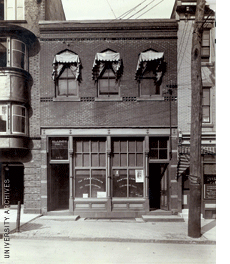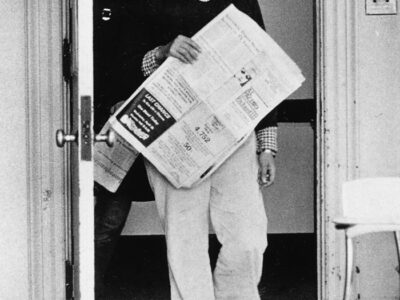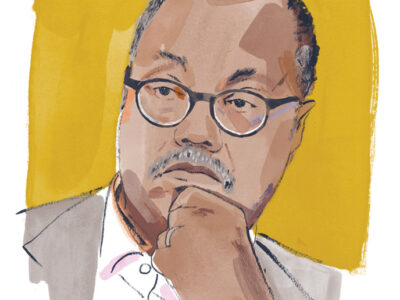Print Run: The Daily Pennsylvanian Celebrates 125 Years

Was this any time for the Daily Pennsylvanian’s alumni to be celebrating?
The University’s daily newspaper turns 125 this year, so eight decades’ worth of former editors, writers, and graphic artists came to campus for a three-day reunion in October. But some of them spent as much time talking about the nebulous future of journalism as they did about their late-night keyboard-pounding and pizza-scarfing of yore. The question asked throughout the weekend was: Does journalism have any future at all? And if not, what happens to the campus’s most widely read student publication?
The weekend included panels with titles like “Journalism’s Future in the Digital Era” and “The DP Today (and Tomorrow).” Attending were 251 alumni and guests ranging from the Class of 1939 to the Class of 2008. Several attendees had made it to the top of the journalistic heap, including two Pulitzer Prize winners: Charles Ornstein C’96, who won in 2005 for a Los Angeles Times series about problems at a local hospital; and Buzz Bissinger C’76, whose Pulitzer came from a 1987 Philadelphia Inquirer series about the Philadelphia courts. There were Emmy winners: Matt Selman C’93, an executive producer of The Simpsons; and TV political reporter Andrew Kirtzman C’82. Participants also hailed from both sides of the political aisle: from Kenny Baer C’94, a communications director in Barack Obama’s White House, to Benjamin Ginsberg C’74, an attorney who represented the Bush-Cheney campaign during the 2000 Florida recount.
Some panels were largely meant to entertain. During a forum on entertainment journalism, Selman said that a Simpsons joke about a new sex-enhancement drug called Bonestra was rejected by the censors, who accepted Jammitin instead. But the talk of the panels mostly revolved around what may become of journalism, and what will happen to America as a result.
“[At Penn], I assumed I would spend my whole career working on daily newspapers,” said Dan Rottenberg C’64 during the “Digital Era” panel. But that assumption wasn’t borne out. “I spent six years on daily newspapers and the rest of my career in city magazines, alternative weeklies, books, and now the Internet. Many of those forms of journalism didn’t exist when I was at Penn. Publishers will always figure out new ways to make money, and there will always be opportunities in journalism.”
Like Rottenberg, several other panelists said journalism has a future, but that it isn’t in print-based media—and that this may mean it’ll take a while to become as reliable or as wide-ranging.
“What if people no longer want what we’re selling?” asked a concerned Peter Spiegel C’92, the senior national security correspondent for The Wall Street Journal. “They’re just not that interested in national or international news.”
“People are too lazy to read,” lamented C. Robert Paul Jr. W’39, while milling about at the cocktail hour before the Saturday night reunion dinner. The most senior alum at the event and a former Penn sports director, Paul said he reads the print edition of The New York Times for four hours each day in his Queens home, but he is not in the majority. “Newspapers are dying,” he said sadly.
Paul’s son, C. Robert Paul III C’77, concurred. “The Internet tends to deal in sound bites as opposed to more comprehensive stories,” he said. “They no longer send reporters around the world. Everyone is relying on half-assed stories. TV is sensational, and the tabloid press is in a race to the bottom.”
Nevertheless, the pessimism was not total.
“Print is dead,” said Stephen J. Marmon, C’71 WG’81. “That’s not the issue. Ten years from now, everyone will have iPods and iPhones. People will still want content. The reporters and editors that the DP produces will be out there and will be key throughout the industry.”
Ornstein may be a harbinger in that regard. Though he won his Pulitzer under the aegis of The Los Angeles Times, he has migrated to the online arena. He now works for ProPublica, a nonprofit investigative-reporting website in Manhattan that is mainly funded by a philanthropic couple in California. Such opportunities are limited, but “I think it’s good that there are these nonprofits out there,” he said. Ornstein added that there are unions and other organizations hiring journalists to dig into specific issues. He also cited the proliferation of small-town news blogs that “are keeping an eye on local government.”
The DP From the Ink Age to the Pixilated Present
The Daily Pennsylvanian was first published on December 15, 1885, as The Pennsylvanian and sold for eight cents. On the cover of the debut issue, the paper’s editorial board explained why the paper was replacing the University Magazine, which had been published by Penn’s literary society, the Philomathean Society. The Philomathean’s membership wasn’t allowed to exceed 50. Some of its members yearned for a publication capable of representing more facets of campus, so they agreed to cease publishing their own journal to make room for a new one whose board would draw from a broader spectrum of University groups and departments.
The paper chronicled presidential elections, foreign wars, changing times, and terrorist attacks. It editorialized that “Hitler must be beaten!” and decried involvement in Vietnam. In 1979, the paper’s computerization committee signed a contract with a company called Mycro-Tek to purchase 11 desktop computers and two phototypesetting machines. At the time, desktop technology was “revolutionary,” said Eric Jacobs EE’80, who has served as the DP’s general manager since the year after his graduation.
Today, the paper prints 12,000 copies each weekday morning as a broadsheet, but it also thrives on the Internet. Its new homepage, TheDP.com, started up around the weekend of the reunion to replace the much longer address www.dailypennsylvanian.com. Stories are posted throughout the evening. The DP’s weekly 34th Street insert is responsible for the most popular blog on campus, UnderTheButton.com, which “gets 4,000 page views a day,” boasted Julia Rubin C’10, the 34th Street editor. “It’s the most read blog not only for the DP, but on campus,” she said. “It’s entertainment, gossip, and news.”
But will gossip become a substitute for the thrice-factchecked bits that end up in print? Libel laws are weaker right now for Internet media than for print, and since a writer can simply delete his words on a website, some argue that there isn’t as strict a standard for what’s posted on the Web as there is for what’s set irreversibly in ink.
Yet current DP staffers seem to think there’s still responsibility in journalism, just a different type.
Said Juliette Mullin C’10, executive editor: “We can put content into print and at the same time it’s on the Internet. I can get calls from California asking about a story. It means more responsibility. Anyone can say anything on the Internet. Our job is to set the record straight.”
Some alums at the reunion privately expressed disappointment with today’s DP staffers, arguing that growing up with the Internet must have made them lazy. They pointed to the fact that the DP now has several editors filling one job—six copy editors, for instance, where the paper used to rely on its regular editors and beat reporters for the task.
When asked about this, Mullin took umbrage, defending her staff as she stood beside DP legal counsel Lee Levine C’76 G’76. She said there are more editors today because the paper is larger, and they no longer use Associated Press wire copy. Not to mention that there’s a whole web staff now.
Buzz Bissinger’s Blues
So with everyone buzzing about the future of journalism, it was no wonder that the keynote speaker for the dinner in Houston Hall Saturday night was H. G. “Buzz” Bissinger C’76, a sportswriter and nonfiction journalist who some time back made a stir with a televised rant about electronic media. In April 2008, he laid into young sports blogger Will Leitch on Bob Costas’ HBO talk show Costas Now, telling Leitch, “I really think you’re full of shit, because I think that blogs are dedicated to cruelty, they’re dedicated to journalistic dishonesty, they’re dedicated to speed.”
At the reunion dinner, Bissinger did not disappoint the crowd.
“Who the fuck wants to listen to a speaker at 10:30?” he asked, before waxing nostalgic about how he and the other “mostly undersized Jews” at the DP “had the giddy feeling that what we did was vital and indispensible, because it was vital and indispensible.”
He said that the more he reads stories about the death of print, the more he believes newspapers will last. “I believe, and maybe it’s naïve, that benefactors and wealthy people in every major city in this country will simply not allow cities to be without a printed voice, even if it means losing money,” he said. “For a major city to not have a newspaper, it is no longer a major city.”
His words came during the same month that Philadelphia Newspapers, LLC, which owns The Philadelphia Inquirer and The Philadelphia Daily News, was talking to a bankruptcy judge about whether lenders to the company would be allowed to seek control of it. (Should both papers fold, the DP could become the top daily in Philadelphia.)
Bissinger told the dinner crowd, “Why does journalism matter? [Why not] give it over to the blogs, give it over to opinion, give it over to the Becks and the Limbaughs and the Hannitys? Today The New York Times had an incredible story by Thom Shanker that really shows what a mess Afghanistan is, whether you are for troop increase or not, whether you are for staying in or getting out. He was able to get a confidential history of a battle that had been fought there in 2008. [It was] not based on the blathering idiocy of the Limbaughs or based on sources plucked from dishonest blogs or websites. [Newspaper reporting] keeps our military honest; it keeps our government honest.”
Yet some attendees emerged from the reunion with a more upbeat attitude.
“A lot of people are in new and unique forms of journalism,” said DP Alumni Association President Dan Gingiss C’96 after the event. “The future of journalism is probably quite strong, but it won’t look like the past of journalism. That’s what I took away.”
Ornstein agreed.
“I was really impressed by the alumni and what they’re doing,” he said. “If you look at the quality of the journalists that are out there, they’re very talented, very smart. It’s not a problem with the people; it’s a problem with the structure, and how people consume the news. In the background [on my computer] I have Twitter up, and that’s how I find out what’s breaking. It’s a totally different way of consuming news than existed a few years ago. I think that’s the reality, and we have to adapt to it.”
—Caren Lissner C’93




